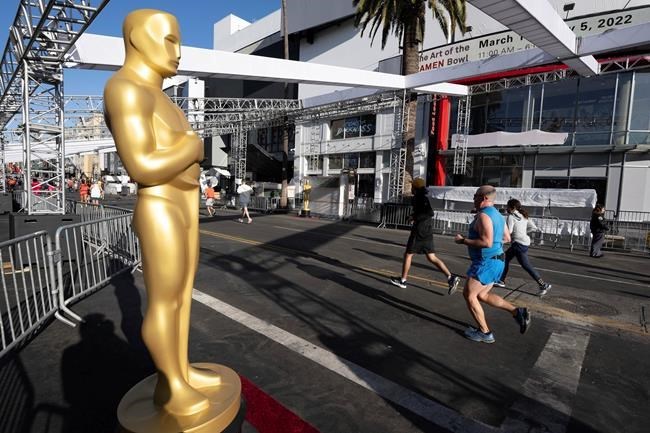
Runners move head past Oscars statues already in place for the 2022 Academy Awards along Hollywood Blvd., during the 2022 Los Angeles Marathon Sunday, March 20, 2022 in Los Angeles. Backlash ensued in February when Academy of Motion Pictures Arts and Sciences president David Rubin announced in a letter to members that the show would begin an hour earlier in order to present eight awards categories prior to the three-hour live telecast in an effort to keep the show "tighter and more electric" and raise viewer engagement. (David Crane/The Orange County Register via AP)
March 25, 2022 - 9:33 AM
TORONTO - A strong Canadian contingent of film talent will vie for Oscar hardware at Hollywood's biggest bash on Sunday, but several hopefuls say the honour has been soured by a controversial new show format that will relegate many of their categories to a taped portion before the broadcast.
Vancouver-based visual effects master Tristan Myles, who is nominated as part of the international team that crafted eye-popping images in the sci-fi epic "Dune" for Quebec director Denis Villeneuve, says splitting the categories denigrates the work of some compared to others.
Myles, a U.K. artist who shares his visual effects nomination with former Vancouver-based colleague Paul Lambert of the U.K., Montreal-based colleague Brian Connor of the U.S. and Gerd Nefzer of Germany, is headed to the bash with fellow "Dune" nominees who fall into the early categories – including Montrealers Donald Mowat for best makeup and hairstyling and Patrice Vermette for best production design.
"Every department is key when you're working on a movie, everyone deserves a similar spotlight," Myles says in a call from Vancouver.
"I'm lucky that hasn't happened to visual effects — yet. I do think the academy is trying, it's a difficult balance to include every department and also not have a crazy runtime.
"But I hope (that next year) they're able to come up with a solution that includes everybody."
The Academy of Motion Pictures Arts and Sciences announced in February that this year's show would present eight awards before the three-hour live telecast in an effort to keep the broadcast "tighter and more electric" for viewers.
Half of those categories have Canadian contenders, including documentary short, makeup and hairstyling, production design and animated short. The other four are live action short, sound, film editing, and original score.
Each of those presentations and winning speeches will be edited and aired later during the live broadcast on ABC and CTV.
Nova Scotia filmmaker Ben Proudfoot and his film "The Queen of Basketball," which tells the story of Lucy Harris, the only woman to be drafted by the NBA and the first Black woman inducted into the Basketball Hall of Fame, is up for best documentary short.
"While I strongly disagree with the academy's decision to debase certain categories, my personal priority is lifting up and celebrating the late Ms. Harris and her wonderful family who will be my guests on Sunday," Proudfoot said in a statement.
"If we are lucky enough to win, I would hope that Ms. Harris' moment on the world stage would not be once again diminished as it has been for 45 years.
"After Sunday night, there is a whole year to engage in discourse to find better ways of saving time that don't affect any category over another, and actualize the full and noble mission of the Academy Awards: to honour all forms and crafts of cinema."
In a similar statement, the National Film Board, whose Canada/U.K. co-production "Affairs of the Art" is up for best animated short, said the organization is "disappointed" in the change "as the Oscars play an amplifying role (and) the NFB is concerned that this decision will serve to further marginalize short films, which already struggle to find large audiences."
Still, Myles, who previously won an Oscar for 2019's astronaut drama "First Man," says he's "thrilled" to attend the ceremony and is thankful for the COVID-19 protocols, which require a negative PCR or rapid antigen test on the day of — though no proof of vaccination.
Myles works in the Vancouver studio of the U.K.-based visual effects and animation studio DNEG (Double Negative), while Connor is in the Montreal office.
DNEG has studios around the world, including London, Mumbai and Los Angeles, but is expanding further into Canada with a planned office in Toronto.
Myles, the British-born co-founder and supervisor of the Vancouver faction, has been living in the Canadian city since 2015, and happily shares that he and his family will — hopefully — be getting their Canadian citizenship later this year, keeping him "where the talent is."
"There was already a strong artists' presence in Vancouver when DNEG arrived," says Myles.
"Here, we have quite a great melting pot, which is important with visual effects because there's so many different ways of doing things, so many different ways of arriving at the same result."
With DNEG having won six out of the last 10 Oscars for best visual effects, Myles' team is considered a front-runner heading into Sunday.
They're joined by Villeneuve, who is nominated for best picture and best adapted screenplay.
Other Canadians up for the gold include several in the "Nightmare Alley" team, among them Saskatoon-bredTamara Deverell and Halifax'sShane Vieau for best production design, Toronto's Luis Sequeira for best costume design and Toronto producer J. Miles Dale for best picture alongside Mexican director Guillermo del Toro.
Also in the running is Quebec producer Roger Frappier as part of the team named for best picture nominee "The Power of the Dog," which leads with 12 nods, and Toronto producer Geoff McLean for best documentary short nominee "Audible."
Canadians will also be handing out trophies, with Elliot Page, Shawn Mendes and Simu Liu all set to present.
This report by The Canadian Press was first published March 25, 2022.
News from © The Canadian Press, 2022